Noah Biggs was an English medical reformer [1] and alchemical writer of the middle of the seventeenth century. In his Chymiatrophilos, mataeotechnia medicinae praxes: The Vanity of the Craft of Physick, [2] from 1651, he attacked pretentious and quack medical theories of his time. He also implied that Galenists in the College of Physicians opposed the Parliamentarian regime. [3] He is credited with introducing the words 'febrile' [4] and 'obesity'.
His book borrowed from John Milton's Areopagitica , and the Advancement of Learning of John Hall. He called for better diet, and criticised bleeding and other remedies of the period.; [5] and warned against lead poisoning. [6] It was addressed to Parliament, and asked for reform of the universities. [7] [8] [9] evidences this attitude in his sharp attack on the universities of his day. It argued that medical practice should be open to all, a point also taken up by William Walwyn. [10]
He is associated with the Paracelsians, [11] and the followers of Joan Baptista van Helmont. [12]

Joseph Glanvill was an English writer, philosopher, and clergyman. Not himself a scientist, he has been called "the most skillful apologist of the virtuosi", or in other words the leading propagandist for the approach of the English natural philosophers of the later 17th century. In 1661 he predicted "To converse at the distance of the Indes by means of sympathetic conveyances may be as natural to future times as to us is a literary correspondence."
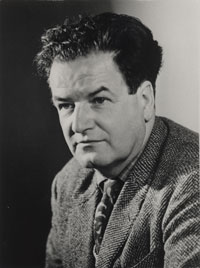
John Edward Christopher Hill was an English Marxist historian and academic, specialising in 17th-century English history. From 1965 to 1978 he was Master of Balliol College, Oxford.
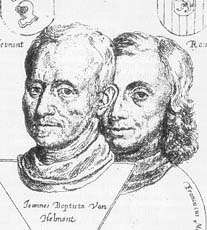
Jan Baptist van Helmont was a chemist, physiologist, and physician from the Spanish Netherlands. He worked during the years just after Paracelsus and the rise of iatrochemistry, and is sometimes considered to be "the founder of pneumatic chemistry". Van Helmont is remembered today largely for his ideas on spontaneous generation, his 5-year willow tree experiment, and his introduction of the word "gas" into the vocabulary of science.

Anne Conway was an English philosopher whose work, in the tradition of the Cambridge Platonists, was an influence on Gottfried Leibniz. Conway's thought is a deeply original form of rationalist philosophy, with hallmarks of gynocentric concerns and patterns that lead some to think of it as unique among seventeenth-century systems.
John Biddle or Bidle was an influential English nontrinitarian, and Unitarian. He is often called "the Father of English Unitarianism".
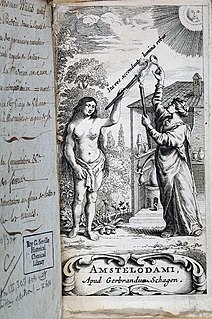
Iatrochemistry is a branch of both chemistry and medicine. Having its roots in alchemy, iatrochemistry seeks to provide chemical solutions to diseases and medical ailments.
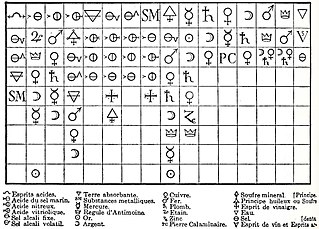
The chemical revolution, also called the first chemical revolution, was the early modern reformulation of chemistry that culminated in the law of conservation of mass and the oxygen theory of combustion. During the 19th and 20th century, this transformation was credited to the work of the French chemist Antoine Lavoisier. However, recent work on the history of early modern chemistry considers the chemical revolution to consist of gradual changes in chemical theory and practice that emerged over a period of two centuries. The so-called scientific revolution took place during the sixteenth and seventeenth centuries whereas the chemical revolution took place during the seventeenth and eighteenth centuries.

Allen George Debus was an American historian of science, known primarily for his work on the history of chemistry and alchemy. In 1991 he was honored at the University of Chicago with an academic conference held in his name. Paul H. Theerman and Karen Hunger Parshall edited the proceedings, and Debus contributed his autobiography of which this article is a digest.
George Starkey (1628–1665) was a Colonial American alchemist, medical practitioner, and writer of numerous commentaries and chemical treatises that were widely circulated in Western Europe and influenced prominent men of science, including Robert Boyle and Isaac Newton. After relocating from New England to London, England, in 1650, Starkey began writing under the pseudonym Eirenaeus Philalethes. Starkey remained in England and continued his career in medicine and alchemy until his death in the Great Plague of London in 1665.
John Dury was a Scottish Calvinist minister and a significant intellectual of the English Civil War period. He made efforts to re-unite the Calvinist and Lutheran wings of Protestantism, hoping to succeed when he moved to Kassel in 1661, but he did not accomplish this. He was a prolific preacher, pamphleteer, and writer.
Benjamin Worsley (1618–1673) was an English physician, Surveyor-General of Ireland, experimental scientist, civil servant and intellectual figure of Commonwealth England. He studied at Trinity College, Dublin, but may not have graduated.
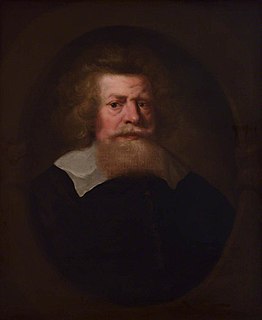
William Dell was an English clergyman, Master of Gonville and Caius College, Cambridge from 1649 to 1660, and prominent radical Parliamentarian.
William Erbery or Erbury was a Welsh clergyman and radical Independent theologian.

Franciscus Mercurius van Helmont was a Flemish alchemist and writer, the son of Jan Baptist van Helmont. He is now best known for his publication in the 1640s of his father's pioneer works on chemistry, which link the origins of the science to the study of alchemy.
John Webster (1610–1682), also known as Johannes Hyphastes, was an English cleric, physician and chemist with occult interests, a proponent of astrology and a sceptic about witchcraft. He is known for controversial works.
John Everard (1584?–1641) was an English preacher and author. He was also a Familist, hermetic thinker, Neoplatonist, and alchemist. He is known for his translations of mystical and hermetic literature.
Gabriel Plattes (c.1600–1644) was an English writer on agriculture and science, and also now recognised as the author of the utopian work Description of the Famous Kingdome of Macaria, often attributed to Samuel Hartlib under whose name it was published.
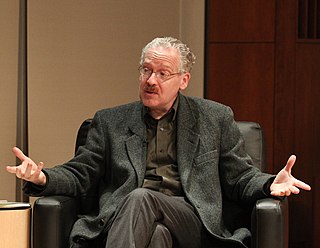
Lawrence M. Principe is the Drew Professor of the Humanities at Johns Hopkins University in the Department of History of Science and Technology and the Department of Chemistry. He is also currently the Director of the Charles Singleton Center for the Study of Premodern Europe, an interdisciplinary center for research at Johns Hopkins. He is the first recipient of the Francis Bacon Medal for significant contributions to the history of science. Principe's research has been supported by the National Science Foundation, the National Endowment for the Humanities, the American Philosophical Society, the Chemical Heritage Foundation, and a 2015-2016 Guggenheim Fellowship. Principe is recognized as one of the foremost experts on the history of alchemy.
William Rand was an English physician who projected general reforms in medical education, practice and publication. His views were Paracelsian and Helmontian, and he participated in the Hartlib Circle.
Robert Child (1613–1654) was an English physician, agriculturalist and alchemist. A recent view is that his approach to agriculture belongs to the early ideas on political economy.








